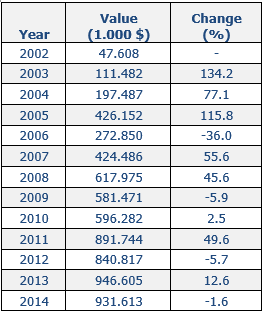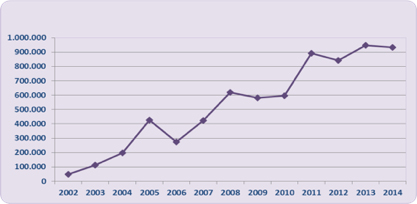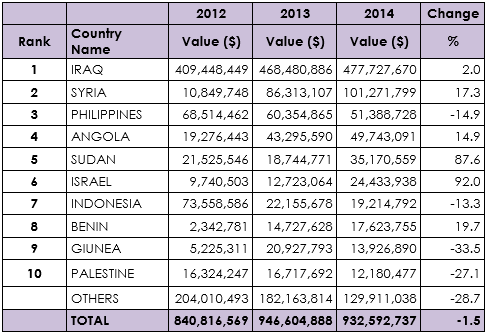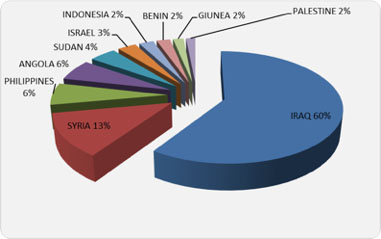


TURKISH WHEAT FLOUR INDUSTRY
PRODUCTION
Turkey has a great agricultural production potential arising out of its ecological and climatological conditions, land property and rich crop pattern. Due to these factors, Turkey is one of the most favored countries in terms of agricultural production.
In Turkey, traditionally cereals lead the list in total agricultural production. Wheat, barley, maize, oats, rye, rice, millet, spelt, canary grass and mixed grain are the main species of cereals grown in Turkey. Especially cool season cereals are grown vastly in comparison with warm season cereals. In particular, wheat and barley are the most important crops among cereals.
Although in Turkey, the production of cereals has shown some fluctuations year by year depending especially on climatological conditions, the total production is more than 30 million tons.
Wheat, the major cereal product in Turkey, has been grown in Anatolia for thousand of years and is a part of life in rural areas. Likewise, it has significant impact in Turkish people’s diet, with an annual consumption of about 250 kg/per head. The shown area in Turkey varies between 7.5 and 9.8 million hectares and the output varies between 17.5 and 22 million tons. Turkish wheat productions totaled 19 million tons in 2014.
Turkey has a significant place among the world's biggest cereal producing countries. While Turkey ranks the 9th in the production of total wheat, ranks third in the production of durum wheat. Due to high quality and quantity production, pastry and milling industry products account for more than 30% of agroindustrial output in terms of value.
The Turkish wheat flour sector has a major position in the world wheat flour export with its high production capacity. Approximately 1,200 wheat flour factories, which are operating in almost every province in Turkey, have the total production capacity around 30 million tons. Konya took first place in the number of wheat flour factories among the provinces. The fact that 10.4 million tons of wheat flour is exported in the world annually reflects the importance of Turkey's output.
EXPORT
Table1 - Turkish Wheat Flour Export

Source: Turkish Statistical Institute (TÜİK)
According to the United Nation statistics, Turkey took first place in global wheat flour export in 2005, 2006 and 2007 and second place in 2008. Turkey took first place by 2009 in terms of value. While Turkey ranked as the first exporter in the world export of the wheat flour in 2010, the convenience to international quality and safety guidelines has made Turkey a top exporter of wheat flour in the world by 2011. In 2012 Turkey ranked as the first exporter in the world export of the wheat flour in terms of value. In 2013 Turkey ranked as the first exporter in the world export of the wheat flour in terms of in terms of both value and quantity by 946.6 million $ in terms of value and 2.2 million tons in terms of quantity.
Graphic 1 - Turkish Wheat Flour Export ($ Thousand)

Source: Turkish Statistical Institute (TÜİK)
In 2007, Turkish wheat flour export increased to 424 million $ as a result of rise in export price although the export quantity decreased. Turkey’s export totaled 618 million $ in 2008, with 46% increase compared to the previous year.
The value of export decreased by 6% to 581 million $ in 2009 in terms of value, however increased by 49% in terms of quantity, as a result of decrease in the export prices.
While Turkish wheat flour export increased in terms of both value and quantity in 2010, Turkey reached 892 million $ (nearly 2 million tons) with 49.6% increase in 2011. In 2012 Turkish wheat flour export was 843 million $ (nearly 2 million tons).Turkey reached 946 million $ (nearly 2.2 million tons) with 12.3% increase in 2013. Moreover, the value of export decreased by 1.6% to 932 million $ (nearly 2.2 million tons) in 2014.
Table 2 - Turkish Wheat Flour Export by Major Destinations

Source: Turkish Statistical Institute (TÜİK)
The main export markets are Iraq, Syria, Philippines, Angola, Sudan, Israel, Indonesia, Benin, Guinea, and Palestine in 2014. The most convenient markets for Turkish wheat flour exports are Middle East, Far East and African countries.
Graphic 2 - Turkish Wheat Flour Export by Major Destinations

Source: Turkish Statistical Institute (TÜİK)
Over the last five years (2010-2014), Turkey exported wheat flour 107 countries in both 2010 and 2011, 117 countries in 2012, 120 countries in 2013 and 118 countries in 2014 throughout the world.
As can be seen from the trade figures, especially in the past decade the Turkish wheat flour sector has been expanding rapidly and playing a more role in the world wheat flour industry. It is likely that Turkey’s wheat flour export will continue its upward trend, particularly to the Far East and Africa with more favorable price and quality.
With high production capacity and quality, Turkey is among the major countries in the world wheat flour trade. Turkish wheat flour is accepted as high quality and globally competitive.
